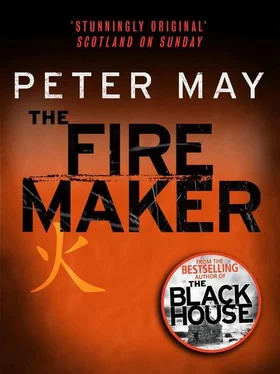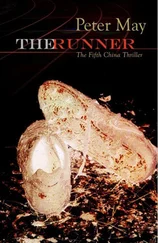‘Not far,’ he said, and steered her north along the west side of the street.
Wangfujing was the shopping street in Beijing, jammed with department stores, boutiques, photographic studios, jewellers. They were all still open, doing brisk business, crowds of evening shoppers thronging the sidewalks, cramming into fast-food restaurants, spending hard-earned yuan on fresh foods and fancy goods. Trolley buses and taxis and private cars and bicycles clogged the road. The east side of the street was in the process of redevelopment along most of its length. Li said, ‘They are building an underground street three hundred metres long on three levels under here.’
‘What for?’ Margaret asked.
‘More shops,’ Li said. ‘Chinese can’t spend their money fast enough these days. But then Wangfujing Street has always been a place for the rich. It is named after ten princes’ mansions built in the Ming Dynasty, and their sweet-water well.’
Suddenly Margaret became aware of a smoky-sweet aroma filling the sticky night air. ‘Hmm,’ she said. ‘Something smells good.’
He smiled, and they turned west into Dong’anmen Street. Margaret stopped and drank in the scene in amazement. ‘Dong’anmen night market,’ Li said.
A row of food stalls stretching as far as the eye could see ran the full course of the north side. Hundreds, maybe thousands, of people were crushed along its length, flitting from stall to stall buying a dish here, a bird on a stick there, eggs fried in batter, noodles. From beneath dozens of striped canopies set cheek by jowl under the trees, smoke rose from hot oil in giant woks on open braziers. All manner of foods were being stir-fried or deep-fried. Huge copper kettles on hot plates hissed and issued steam into the night sky, boiling water tipping from long curling spouts to make bowls of thick, sweet almond paste. Li steered Margaret gently through the crowds, past stall after stall groaning with skewered meat and vegetables, whole fish, barbecued baby quails impaled on chopsticks, heads and all. Dozens of chefs in white coats and hats sweated over steaming vats on hot coals, drawing out bamboo racks of steamed buns filled with savoury meats or sweet lotus paste. Rice and noodles and soup were served in bowls, with buckets set at the roadside for the dirty dishes. You bought and ate or drank on the spot. It was a meeting place as well as an eating place, whole families gathering with friends to eat and talk under lights strung from the trees overhead.
Cooks shouted at Li and Margaret as they passed, beckoning them to try their fare. Three yuan a time, Li told her. Livings were made on the basis of volume sales. It was a feast for the eyes as well as the stomach, and just looking at all the food was making Margaret salivate. ‘Have what you want,’ Li said. ‘Just point and we’ll get it.’
They had bowls of rice and barbecued satay with a wonderful spicy peanut sauce, eggs fried in dough, noodles and pickled shredded vegetables. Between each course, they thirstily devoured large chunks of watermelon, skewered on chopsticks, to cleanse the palate. They tried sticks of marinated pork, others of beef, stir-fried with sesame seeds and soy, chunks of pineapple coated in seed and seared over red-hot coals, soup, and almond paste dessert.
‘Stop, stop! I can’t eat any more,’ Margaret said finally, laughing. ‘Take me away from here. I’ll burst.’ It was impossible to look without wanting to taste.
Li grinned. ‘Your eyes are bigger than your stomach.’
‘My stomach’ll be too big to squeeze into any of my clothes if I’m not careful.’
She was holding his upper arm, quite naturally, and without thinking. And as she turned she felt her breasts brush his forearm, a tiny, tingling, thrilling sensation that stirred the seeds of desire somewhere deep inside her. She knew he’d been aware of it, because she felt him tensing. She released his arm and they moved a little apart, self-conscious and awkward, and started walking slowly. She did a quick mental calculation. Li had spent around fifty yuan, just over six dollars, for everything they had eaten. And with a pang of conscience, she remembered how poorly paid the Chinese were compared to affluent Westerners. Fifty yuan was probably a lot of money to him. She determined that the next time, she would treat him . They sauntered idly through the crowds in the direction of the Forbidden City. She took his arm again, and glanced up at him. Why had she ever thought he was ugly? ‘How come you never married?’ she said.
His step did not falter, and he kept his eyes straight ahead. ‘In China it is policy to encourage people not to marry young.’
She looked at him sceptically. ‘And that’s why you never married?’
He reddened. ‘Not really. I guess I just never met anyone I wanted to marry.’
‘Cops,’ she said. ‘The same the world over. It’s not a job, is it? It’s a way of life.’
Until a matter of hours ago, Li would have believed that to be true for him. His widowed uncle had been his role model. Single, driven, ultimately successful. Li had never met his aunt, never really pictured Old Yifu and his wife together. He had always known, because Yifu would never talk about it, how much he missed her. But today, in the park with Margaret, Old Yifu had revealed more of himself than Li had seen in twelve years. And for the first time, Li realised that it was the loss of his wife that had driven Yifu all these years. His work, his pursuit of success, had all been a means of filling the void left by her death. He would have traded it all for the chance of five more precious minutes with her. It was making Li question now what was driving him . If there was a void in his life, it had always been there. He had no memories of a life shared with someone he loved. He had no real sense of what love was, separated as a very young child from his parents, his mother torn away from him, never to be returned. His job, he understood now, wasn’t a way of life, it was an alternative to one.
Margaret had watched the sadness descend on him in an instant, like a veil, his dark eyes deep and languid, almost mournful. ‘A yuan for them,’ she said.
‘Hmm?’ He looked at her distractedly.
‘Your thoughts.’
He dragged himself away from them and forced a smile. ‘They’re not worth half that,’ he said. And, quickly, to change the subject, ‘Are you thirsty?’
She nodded. ‘Very.’ All that salty, sweet food.
‘We’ll go get some tea,’ he said. ‘I know a place.’
The Sanwei Bookstore was in a small side street off Fuxingmennei Avenue, opposite the Minorities Palace. It was dark here, leafy spreading trees casting shadows from the streetlights, the noise of traffic on the avenue muffled by a bank of trees on the sidewalk side of the cycle lane. Dark hutongs ran off into a maze of siheyuan courtyards, dusty and crumbling and newly emerged from behind hoardings raised during the construction of a new stretch of Underground. Everywhere, families had left the cramped and unbreathable spaces they occupied in tiny houses and spilled out on to the pavements to sit on walls, drinking jars of tea and chatting idly. Men squatted in groups under the trees playing chess, and children chased up and down the sidewalks, burning up energy and their mothers’ patience in the stifling heat of the night.
Li and Margaret had taken a No. 4 bus from the bottom end of Wangfujing. It was an experience for Margaret — standing room only, crushed among the bodies squeezed into the long articulated vehicle, curious faces staring at her with undisguised amazement. Yangguizi never travelled on buses. It was unheard of. And this one was particularly strange. Fair-haired and blue-eyed. A tiny child, clutching at her mother’s breast for fear the foreign devil would snatch her away, couldn’t take her eyes off Margaret for the entire journey.
Читать дальше












